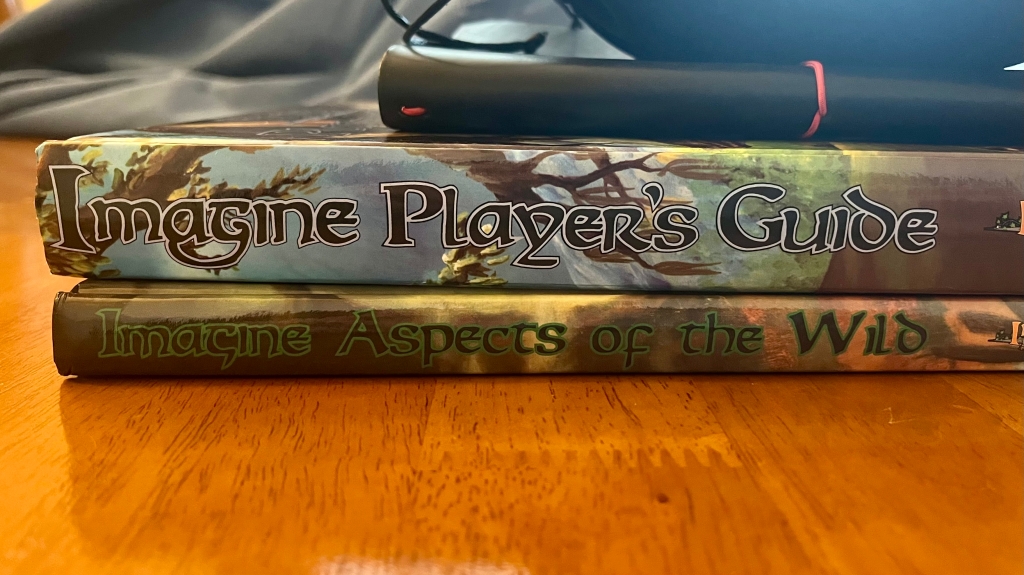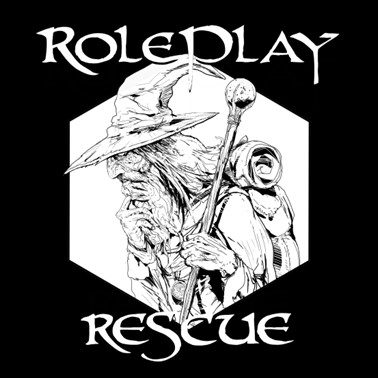What if the the term Non-Player Character is a misnomer? If we accept James D’Amato’s assertion that the Game Master is a player at the table too then surely this is the case. Which got me thinking about what an NPC really is all about. This post is me thinking out loud.

Playing solo, I create for myself a primary character with which to play. I might even build an entire party of characters who are (for want of a better word) the protagonists of the adventure. But then, because this party faces some opposition, I also get to determine the characters who are antagonistic to that primary group. And then I play their roles too.
Clearly, as I am the player of the solo game, all the characters are in fact played by me. They are all “player characters” in that sense. A character played by a non-player is, by definition, not played. Thus, there aren’t really any non-player characters.
Unless the GM is viewed as not playing, there are only player characters in a group game too. There are the characters played by each member of the playing group (usually called “players”) and there are the characters played by the GM.
In the Imagine RPG, the term “GMC” for “Game Master Character” is used instead of NPC. The idea is that the GM is a player in the game, they play the various characters that are not the primary characters played by other players, and thus these are GM characters.
The term GMC has been given a negative connotation in some quarters because it’s associated with the idea of a GM having their own character in the game whom they then favour over the other player’s characters. But that’s not what GMC means in Imagine.
A GMC is a character roleplayed by the GM, while a PC remains a character roleplayed by the other players. This acknowledges the traditional role of the GM as a different kind of player who has different responsibilities. It also elevates the stature and expectation of those GMCs at the table.
Of course, we might choose to do away with the special responsibilities of the player we label GM and replace them with (say) a GM Emulator toolset, such as Mythic. Then there might be such a thing as an NPC… because no human is playing them and their reactions have been outsourced to some other determinant. But most people don’t play this way.
So what? I mean, really, who cares? We all know what an NPC is, right?
Well, maybe we do. But I know my play suffers when I consider these characters as nothing more than stats on a page or even just a couple of notes – like a name, role, and simplistic motivation. What if I elevated them to being characters I genuinely roleplayed at the table?
Most GMs would say that they play their characters. Why not own that reality and then work to spend more time in-role as those GM-run characters? Speaking for myself, I need to lose the bias towards “NPCs” being simple “Monsters” because this reduces them to fodder and simplistic “bad guys”… and I want deeper play at the table.
Sometimes thinking about what we mean helps to clarify the actions we take at the table. In my play, I’m starting to treat the creation of GM-run characters as seriously as I might building my own character for regular play. I want to give them a place in the world and a set of goals, then play that role.
Non-play in a game seems like a contradiction. Are we really saying that the GM should not play the characters? What would happen if the GM could bring those characters to life and let them fail (or succeed) against the other player-run characters with simple ease?
Game on!

this got me thinking about “Clash of the Titans”. Is the GM playing greek god-like characters who place people, creatures and obstacles in the hero’s path either to help or hinder them? “try me first!”
LikeLiked by 1 person
In solo at least, I increasely see little to no distinction between the two, and find the otherworld immersion is increased when I spend time developing ‘NPCs’ to be as rounded as the protagonists.
LikeLiked by 1 person
This is a good take, and I know I would benefit more from taking my “NPCs” seriously. The thing is, even as a player I don’t really know my character until I played them in a few sessions. One reason I like to GM is cuz I’m not as interested in roleplay, but I’m happy to run the simulation and challenge the players. Maybe that makes me a bad GM I don’t know.
I think maybe Savage worlds have something to offer here: they distinguish in PCs between wild cards and extras. A wild card is basically a major “named” NPC, like in a movie when you get a major start of playing antagonist, and an extra is basically one of those faceless goons that are only there to be mowed down.
they could maybe be called RCs (referee characters) and SCs (supporting characters). Maybe that’s not the right terminology I don’t know.
but I actually think this touches on a deeper issue: as a player, I’m dedicated full-time to my character. A GM only place the character when they’re on screen, and then they mostly cease to exist when they’re off screen. That makes it really hard to get into the role or treat them as more than two dimensional. You can’t really get into their psyche and develop their personality unless you spend some actual time playing.
One idea I really like and I really had any chance to do anything with is the idea of an adversary player. (I think I got the idea from GURPS.) Basically a player dedicated full-time to playing GMCs. It would be a little bit like a single GM running two parties, except that one party is playing the villains full time. That means even when the villains off screen the adversary is still scheming and plotting and doing things. The adversary understands they’re ultimately going to be defeated, that even though they’re playing on the GM’s behalf the GM is going to be orchestrating events against them; but they can play with their full intelligence, do everything they can to win, not pull their punches. No fudging! I think that would be really fun to do that. In order to make this work I think the adversary has to have limited knowledge, just like the PCs do, and I’m not sure how that would work at the table forever one can hear everyone else.
So then in this setup you would have an AC (adversary character) and the GM would run all the extras as faceless goons that don’t really require roleplay. Or you could assign them to the adversary as minions, sort of like how PCs sometimes command NPC hirelings.
Something to think about.
(Ugh. This software is very buggy. Writing this comment it keeps re-rendering the page sending me to other places in the middle of trying to type… Even the select all function doesn’t work reliably.)
LikeLiked by 2 people
Firstly, no you are not a “bad GM” if you run in a different style. There is no One True Way, just many paths depending on where you want to end up. I would question whether the Referee of an Old-School D&D-inspired game is a player – in the same way that the Ref at a football match is not a player. The role there is different.
I too like the idea of an Adversary Player but I have yet to find a player willing to play that way.
And yes, WordPress has issues. Thank you for posting in spite of that.
LikeLiked by 1 person
I wonder if applying this to group play has a noticeable effect on how players treat NPCs/GMCs? Even the most rabid murderhobo player is usually a little more respectful of other players’ characters, if only so they don’t get kicked out of the game. A little reminder that every character has a player behind it, even if they’re just Generic Shopkeeper #37 that the GM made up ten seconds ago, might encourage people to treat them more like characters.
LikeLiked by 1 person
If an NPC in my solo games sticks around long enough. they almost always become a full-fledged PC — even if they’re still secretly a villain/antagonist. I don’t have a mechanism for it; it just happens when I know the character well enough that I don’t have to bother rolling for their actions.
I do try to play all my NPCs (as a group DM or solo) as people unto themselves. In my DSA game, my PC’s party met a random wizard who accompanied them into a dungeon. The dungeon went very badly, and my PC and the wizard were lucky to get out alive. Someone commented on his subsequent reaction to her, wondering if he was projecting his anger at himself onto her (he totally was). I pointed out that, from the wizard’s perspective, my PC was his random encounter.
LikeLiked by 1 person